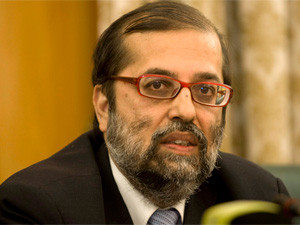
Communications minister Yunus Carrim has issued a statement in response to broadcasters that are unhappy about the Department of Communications' (DOC's) decision regarding conditional access in digital terrestrial television (DTT) decoders.
In the statement, sent to media houses this afternoon, Carrim reminds the industry that broadcasters are now free to decide whether or not to use a control system in set-top boxes (STBs). "On 4 December Cabinet decided that the use of a control system in STBs - or decoders - for digital television would not be mandatory, as was the case in the previous Broadcasting Digital Migration policy."
However, he notes, it was decided that the STBs would have a control system to protect government's investment in the subsidized STB market and the local electronics industry and - with rapid technological changes - for future use by broadcasters who might not want to use it now.
"To avoid subscription broadcasters unfairly benefitting from the STB control system, government's investment in the STB control system will be recovered from those subscription broadcasters that choose to make use of the STB Control system."
Cabinet's criteria
Outlining the criteria Cabinet used to reach its decision two weeks ago, Carrim said in the statement that, with SA being five years behind schedule and the International Telecommunication Union 2015 deadline looming, there was an urgent need to release radio frequency spectrum.
"Importantly, the STB control matter relates to broader issues of industrial policy, particularly the need to stimulate the local electronics industry, encourage emerging entrepreneurs, and create jobs. It cannot be seen simply as a broadcasting issue. We worked closely with the Department of Trade and Industry in developing government's approach."
Carrim says the DOC considered dropping control altogether, but there were obstacles that eradicated this possibility, including that the South African Bureau of Standards standard SANS 862 would have to be changed (a process that takes an average of six months) and concerns that the South African market will be flooded by cheap low quality STB imports that will not be fully functional and undermine the local manufacturing industry and the prospects of jobs.
Legal challenge
Carrim says there could be a legal challenge to government by manufacturers who invested in control system certification and STB designs.
Regarding eTV's court judgment, he says, "lawyers we consulted are clear that government has the right to make policy on STB control but it cannot prescribe the supplier, the operator of the control system, the type of control system to be used or how it should be managed."
Carrim says the DOC was threatened with legal action from several parties to the dispute, and had to "tread a careful path".
The policy the department shaped, he says, sought to address the key concerns of all the parties to reduce the prospects of this.
"We have not made a decision about the management of a control system. Nor do we refer at all to conditional access or encryption as methods of implementing STB control. We are saying that broadcasters are free to decide whether they want to use control or not. There is no compulsion. So we can't see how we are going against the court order. Furthermore, we have proposed generic control, which refers to any system which can be used to control the functions of a STB. We are not proposing a particular or specific system.
"For a long while, the broadcasters have been feuding about whether to have a control system or not. Both former Minister Pule and I encouraged the broadcasters to arrive at consensus, but to no avail. In September the Ministry began a new facilitation process led by a team chosen by the broadcasters to foster a measure of consensus, but, with the parties refusing to make any compromises at all, the facilitators reached an impasse.
"Our original aim was to reduce the differences among the broadcasters and then engage with the entrepreneurs in ways that are legally tenable to set up a representative committee to work with government to amend the broadcasting digital migration policy so that we could move quickly ahead. We very much wanted the parties to come to an agreement, but the facilitators were unable to secure even the most minimal consensus."
He says government consequently shaped its policy taking into account what all the parties had to say. "What else could we do? The country could not be endlessly held to ransom by the feuding of the broadcasters.
"There has been concerted consultation with the parties. It is a matter of considerable regret that parties are now threatening to go to court because they could not get everything they want and are seeking to delay further the already long overdue digital migration process. We are still committed to engaging with them and request them to cooperate.
"On 5 December we briefed all the broadcasters on the Cabinet's decision and requested them to make submissions on the 6 December gazetted version of amendments to the broadcasting digital migration policy. We also suggested a joint technical committee be set up to clarify matters and settle any outstanding differences."
Carrim says the broadcasters "have not responded favourably" to this and the DOC remains committed to engaging with them.
Share